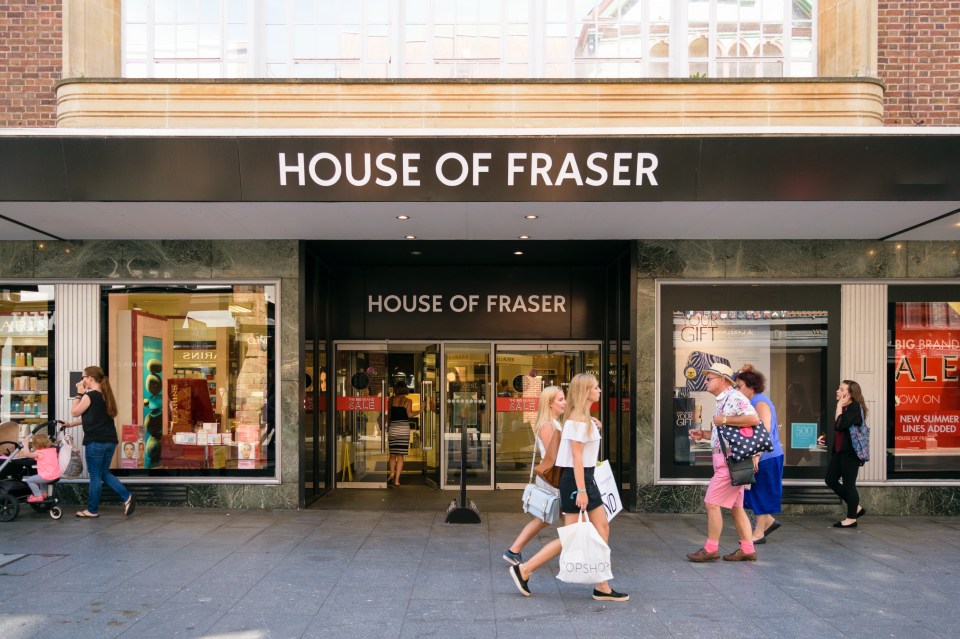AFTER nearly three decades of trading, a popular House of Fraser store is set to close.
The department store in Victoria Centre, Nottingham, which first opened in 1997, will roll down the shutters in October this year.
It’s bittersweet news for shoppers, who have been treated to a 20 percent off sale inside the store.
The once-thriving shopping hub was nearly shut in 2022 after Fraser Group chief exec Michael Murray described the brand as a “broken business”.
At the time, he said: “House of Fraser was a broken business when we bought it.
“We’ve completely changed the operating model. It was mostly concession, the stores were way too big, they were under‑invested.
“Our future vision is that House of Fraser will diminish and Frasers will grow.”
Once boasting more than 60 stores across the UK, the department store has steadily shuttered locations since its 2018 acquisition by Mike Ashley’s Frasers Group.
Between 2022 and 2025 alone, over a dozen sites—including flagship locations like Oxford Street and regional mainstays in Cardiff, Cheltenham, and Nottingham—have closed their doors.
The closures reflect a deeper failure to adapt to a rapidly evolving retail landscape.
Many of its stores were oversized and heavily reliant on concessions—third-party brands renting space—which offered little control over stock or customer experience.
Frasers Group is now repositioning itself around a new retail vision, investing in smaller-format “Frasers” stores and upmarket lifestyle hubs, with sport and luxury offerings as its focus.
The Sun has approached House of Fraser representatives for comment.
House of Fraser is just one brand struggling against recent economic pressures and changes in consumer habits.
A combination of rising inflation, energy costs, and interest rates has squeezed both household spending and business margins, creating a perfect storm for retail operators.
For many consumers, essentials have taken priority over discretionary purchases, leading to a noticeable decline in footfall and in-store spending.
Even major players with established reputations have found themselves forced to close stores, reduce staff, or pivot entirely toward e-commerce.
This comes as Poundland bosses implemented a series of closures this year after the business was hit by spiraling operating costs and weakening footfall.
In Cornwall, one Poundland was evicted from one of its locations – leaving staff locked out of work overnight.
The budget chain was kicked out of its store on Fore Street in St Austell, CornwallLive reported.
A bizarre notice was also posted in the window of the popular store.
It read: “We as authorised agents acting on behalf of the above-named landlord have today re-entered these premises and any lease or licence is hereby determined.
“Any attempt to enter these premises without the written authority of the above-named landlord will result in criminal/civil proceedings being taken.”
A Poundland spokesperson confirmed that the locks were changed overnight without notice.
RETAIL PAIN IN 2025
The British Retail Consortium has predicted that the Treasury’s hike to employer NICs will cost the retail sector £2.3billion.
Research by the British Chambers of Commerce shows that more than half of companies plan to raise prices by early April.
A survey of more than 4,800 firms found that 55% expect prices to increase in the next three months, up from 39% in a similar poll conducted in the latter half of 2024.
Three-quarters of companies cited the cost of employing people as their primary financial pressure.
The Centre for Retail Research (CRR) has also warned that around 17,350 retail sites are expected to shut down this year.
It comes on the back of a tough 2024 when 13,000 shops closed their doors for good, already a 28% increase on the previous year.
Professor Joshua Bamfield, director of the CRR said: “The results for 2024 show that although the outcomes for store closures overall were not as poor as in either 2020 or 2022, they are still disconcerting, with worse set to come in 2025.”
Professor Bamfield has also warned of a bleak outlook for 2025, predicting that as many as 202,000 jobs could be lost in the sector.
“By increasing both the costs of running stores and the costs on each consumer’s household it is highly likely that we will see retail job losses eclipse the height of the pandemic in 2020.”













